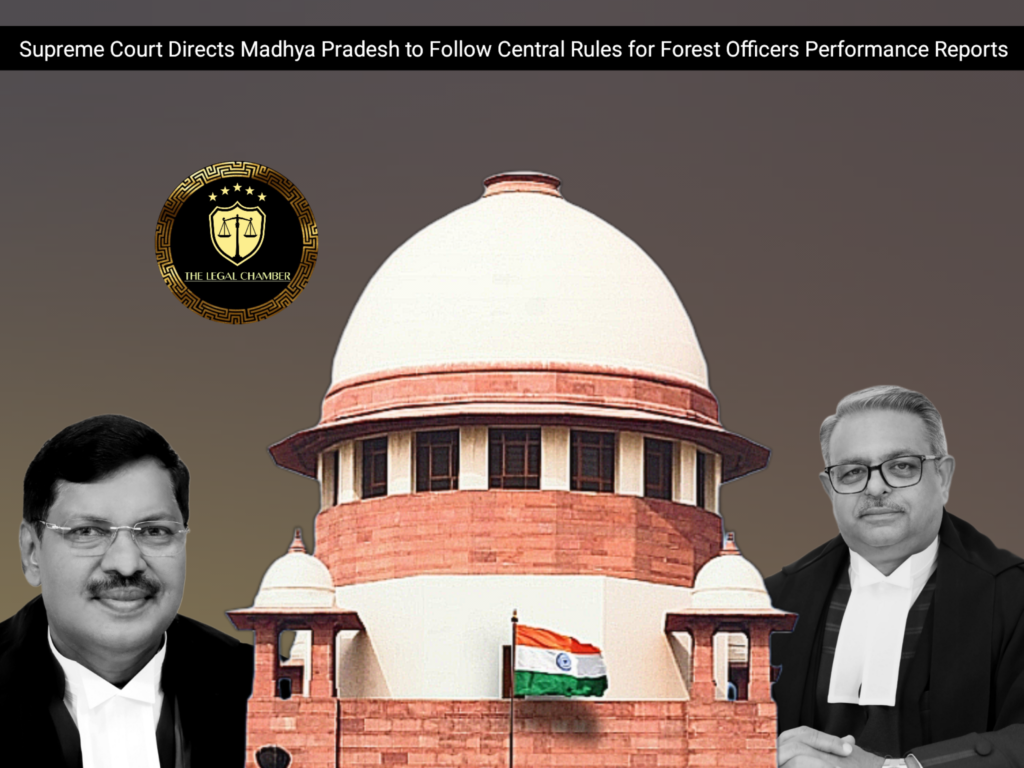
The Supreme Court quashed the Madhya Pradesh Government Order (G.O.) dated 29th June 2024, which allowed IAS officers to evaluate Indian Forest Service (IFS) officers’ Performance Appraisal Reports (PAR). Reaffirming its 2000 ruling, the Court held that IFS officers up to the rank of Additional Principal Chief Conservator must be assessed by their departmental superiors, not IAS officers, to maintain service hierarchy and accountability under the All-India Services (Confidential Rolls) Rules, 1970. The State was directed to amend its rules within one month to comply with this mandate.
Facts Of The Case:
The case arose from a challenge to the Madhya Pradesh Government Order (G.O.) dated 29th June 2024, which mandated that Indian Administrative Service (IAS) officers – specifically District Collectors and Divisional Commissioners – would evaluate the Performance Appraisal Reports (PARs) of Indian Forest Service (IFS) officers, including Divisional Forest Officers and Conservators of Forests. The IFS officers contested this, arguing that it violated the All-India Services (Confidential Rolls) Rules, 1970, and Supreme Court precedents, particularly the 2000 judgment in Santosh Bharti v. State of Madhya Pradesh, which held that forest officers must be assessed by their departmental superiors, not IAS officers. The State defended the G.O., citing administrative hierarchy and the need for inter-departmental coordination. However, the Court noted that similar issues had been settled in 2000, and the Central Empowered Committee (CEC) had reiterated in 2004 that IFS officers’ appraisals should be conducted by their own service seniors, except for the Principal Chief Conservator of Forests, who reports to a higher-ranking non-IFS authority. The Court found the G.O. contemptuous for disregarding its earlier directives and struck it down, ordering Madhya Pradesh to realign its rules with the 1970 Rules and judicial precedents within one month. The judgment reinforced the autonomy of All-India Services in performance evaluations.
Procedural History:
The case has its roots in the long-standing T.N. Godavarman Thirumulpad forest conservation litigation (W.P. No. 202 of 1995). The immediate controversy began when the Madhya Pradesh government issued the impugned G.O. on 29th June 2024, altering the PAR evaluation system for IFS officers. This triggered multiple interlocutory applications (IAs) in the ongoing Godavarman case, challenging the G.O. as violative of the Supreme Court’s 2000 judgment in Santosh Bharti v. State of MP and subsequent orders. The 2000 ruling had established that IFS officers must be assessed by their departmental superiors, a principle reaffirmed by the Court in 2004 after examining a CEC report. When the 2024 G.O. revived the contentious practice of IAS officers evaluating IFS personnel, the matter was listed before a 3-judge bench headed by CJI B.R. Gavai. The Court heard arguments from amicus curiae and the Solicitor General, examined the 1970 Confidential Rolls Rules, and reviewed compliance across states. Finding the G.O. in contempt of its 2000 and 2004 directives, the bench delivered its judgment on 21st May 2025, quashing the order and mandating rule amendments within one month, thus concluding this latest chapter in the two-decade-old service rules dispute.
READ ALSO : Big Win for Judges: Supreme Court Reduces Experience Needed for Higher Judicial Posts
Court Observation:
The Supreme Court made several critical observations while striking down the Madhya Pradesh Government Order. It emphasized that the hierarchical integrity of All-India Services must be preserved, noting that the 1970 Confidential Rolls Rules clearly mandate performance evaluations by an officer’s departmental superiors. The Court observed that allowing IAS officers to assess IFS officers would undermine the specialized nature of forest services and create an anomalous situation where reviewing authorities might lack domain expertise. It reaffirmed its 2000 ruling in Santosh Bharti, stressing that only the Principal Chief Conservator of Forests – as the highest-ranking IFS officer – could legitimately have a non-IFS reporting authority. The bench particularly noted that the state’s attempt to circumvent established judicial precedents through administrative orders was “contemptuous in nature,” though it refrained from initiating contempt proceedings. The judgment underscored that inter-departmental coordination could be achieved through separate comment mechanisms without disrupting the established appraisal system, thereby balancing administrative needs with service-specific autonomy.
Final Decision & Judgement:
The Supreme Court delivered a decisive judgment quashing the Madhya Pradesh Government Order dated 29th June 2024, which permitted IAS officers to evaluate IFS officers’ performance reports. Reaffirming its 2000 precedent in Santosh Bharti, the Court ruled that IFS officers up to the Additional Principal Chief Conservator rank must be assessed by their immediate superiors within the Forest Department, maintaining service-specific hierarchy under the All-India Services (Confidential Rolls) Rules, 1970. Only the Principal Chief Conservator of Forests, as the department head, could be evaluated by a non-IFS authority. The Court directed the state to amend its rules within one month to comply with this mandate, emphasizing that any deviation from this framework without judicial approval would undermine the integrity of specialized services. The judgment preserved the 2000 and 2004 rulings while allowing for inter-departmental coordination through separate comment mechanisms, ensuring both accountability and functional autonomy for IFS officers.
Case Details:
Case Title: In Re: Performance Appraisal Reports of the Officers of the Indian Forest Service (linked to T.N. Godavarman Thirumulpad v. Union of India & Ors.) Citation: (2025) INSC 748 Case Number: Writ Petition (Civil) No. 202 of 1995 Date of Judgment: May 21, 2025 Bench: Chief Justice of India B.R. Gavai & Justice Augustine George Masih
Download The Judgement Here